"An uninhabited space in the country is just a piece of land to them," PM Modi said.
Prime Minister Narendra Modi took on Congress's Digvijaya Singh today over his recent comment on Katchatheevu, the island near Rameswaram that India ceded to Sri Lanka in 1974. Mr Singh's argument that the tiny island is uninhabited, received a sharp retort.
"If no one lives there, does that mean you can give it away? Then what about this desert? Will you say no one lives here?" PM Modi said at a public meeting in Rajasthan's Karauli.
"An uninhabited space in the country is just a piece of land to them. They can give away any place in Rajasthan like that," he added.
Yesterday, asked about the BJP allegation that the Congress had handed over the island to Sri Lanka, Digvijaya Singh had told reporters, "I want to ask whether anyone is living there on the Katchatheevu island". Asked about the problems being faced by fishermen and whether the Congress contributed to it, he said, "These are baseless talks".
His comments have stirred a hornet's nest, with many in the BJP recalling India's first Prime Minister Jawaharlal Nehru's comment that "Akshai Chin is barren land".
The BJP, which has been trying hard to find a toehold in the closed Dravidian politics in Tamil Nadu, has been highlighting Katchatheevu ahead of the election, hoping it will gain traction and snowball into an election issue
Katchatheevu was a disputed territory between India and Sri Lanka since the British period. The British, citing the traditional claims of the Ramnad zamindari of Ramanathapuram, had attached it to the Madras Presidency.
But the dispute broke out again after Independence over fishing rights around the island.
To settle the discord and strengthen ties with Sri Lanka, the government headed by Indira Gandhi had agreed to cede it to Sri Lanka under the 1974 "Indo-Sri Lankan Maritime agreement".
At the time, the uninhabited volcanic island -- 1.6 km in length and around 300 m wide – was thought to have little strategic value. But over the last decades, the situation has changed owing to the rise of China and its growing influence over Sri Lanka.






Leave a Reply